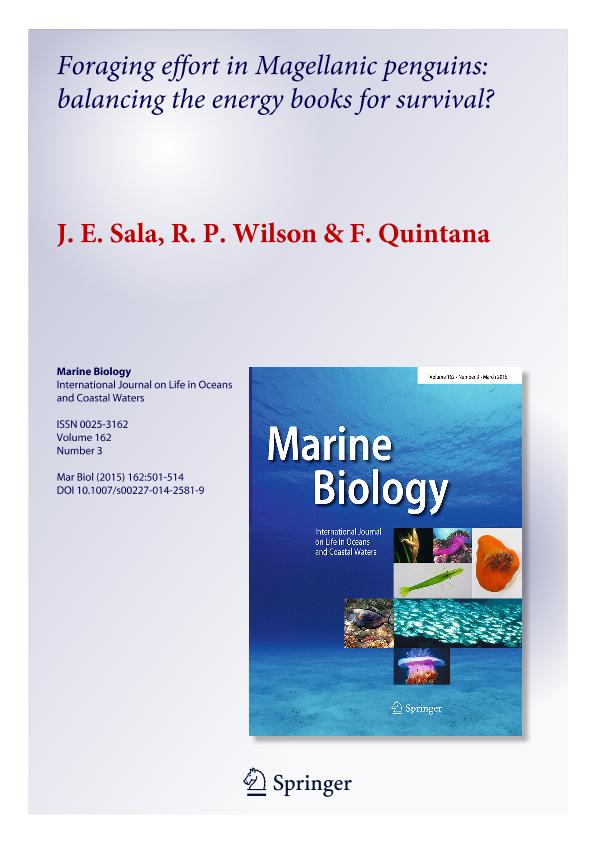Mostrar el registro sencillo del ítem
dc.contributor.author
Sala, Juan Emilio

dc.contributor.author
Wilson, Rory P

dc.contributor.author
Quintana, Flavio Roberto

dc.date.available
2017-07-17T21:19:22Z
dc.date.issued
2014-11-27
dc.identifier.citation
Sala, Juan Emilio; Wilson, Rory P; Quintana, Flavio Roberto; Foraging effort in Magellanic penguins: balancing the energy books for survival?; Springer Verlag Berlín; Marine Biology; 162; 3; 27-11-2014; 501-514
dc.identifier.issn
0025-3162
dc.identifier.uri
http://hdl.handle.net/11336/20766
dc.description.abstract
The determination of activity-specific energy expenditure of wild animals is key in ecology and conservation sciences. Energy management is crucial for seabirds during the breeding season when they need to maintain a positive balance between energy intake and the metabolic costs for them and their young. We analysed information from accelerometers to estimate the energy expenditure of Magellanic penguins (Spheniscus magellanicus) foraging at sea during the early chick-rearing period from four Patagonian colonies (i.e. Punta Norte, Bahía Bustamante, Puerto Deseado and Puerto San Julián). We studied how activity-specific energy consumption affected total energy expenditure during foraging and considered how this related to the current status and trends of breeding populations. The derived diving energy expenditure of penguins differed between sites, with inter-colony differences being primarily due to variability during the bottom and ascent phases of the dives: bottom phase energy expenditure was largely determined by the total distances travelled during the search, pursuit, and capture of prey, rather than the time per se allocated to this phase. Those colonies where the rate of population change was lowest also expended the most energy per trip due to greater times spent underwater and/or undertaking a higher number of dives per trip. Finally, the total energy consumption as well as the rate of energy expenditure per trip was good indicators of trends in breeding populations.
dc.format
application/pdf
dc.language.iso
eng
dc.publisher
Springer Verlag Berlín

dc.rights
info:eu-repo/semantics/openAccess
dc.rights.uri
https://creativecommons.org/licenses/by-nc-sa/2.5/ar/
dc.subject
Overall Dinamic Body Acceleration (Odba)
dc.subject
Estimated Energy Expenditure
dc.subject
Magellanic Penguin
dc.subject
Pheniscus Magellanicus
dc.subject
Inter-Colony Differences
dc.subject
Patagonia
dc.subject
Conservation
dc.subject.classification
Ecología

dc.subject.classification
Ciencias Biológicas

dc.subject.classification
CIENCIAS NATURALES Y EXACTAS

dc.title
Foraging effort in Magellanic penguins: balancing the energy books for survival?
dc.type
info:eu-repo/semantics/article
dc.type
info:ar-repo/semantics/artículo
dc.type
info:eu-repo/semantics/publishedVersion
dc.date.updated
2017-07-13T14:01:29Z
dc.journal.volume
162
dc.journal.number
3
dc.journal.pagination
501-514
dc.journal.pais
Alemania

dc.journal.ciudad
Heidelberg
dc.description.fil
Fil: Sala, Juan Emilio. Consejo Nacional de Investigaciones Científicas y Técnicas. Centro Nacional Patagónico; Argentina
dc.description.fil
Fil: Wilson, Rory P. Swansea University; Reino Unido
dc.description.fil
Fil: Quintana, Flavio Roberto. Consejo Nacional de Investigaciones Científicas y Técnicas. Centro Nacional Patagónico; Argentina
dc.journal.title
Marine Biology

dc.relation.alternativeid
info:eu-repo/semantics/altIdentifier/doi/http://dx.doi.org/10.1007/s00227-014-2581-9
dc.relation.alternativeid
info:eu-repo/semantics/altIdentifier/url/https://link.springer.com/article/10.1007%2Fs00227-014-2581-9
Archivos asociados
